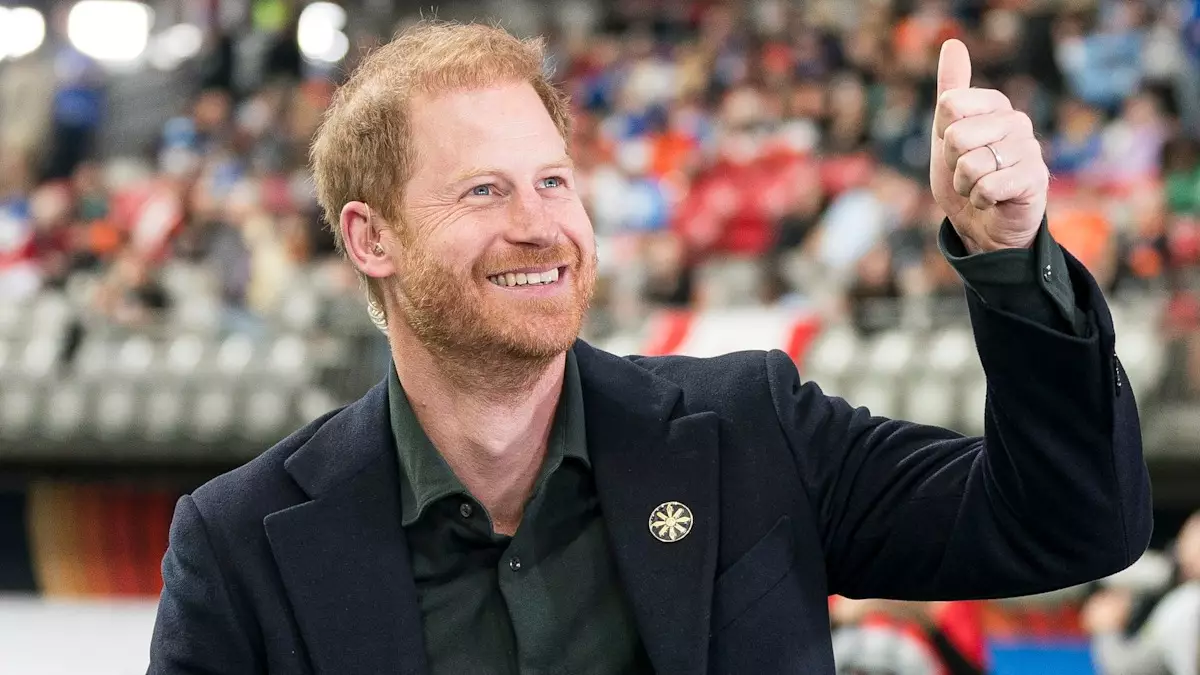In the ever-evolving world of celebrity, few narratives are as compelling as that of Prince Harry. Since stepping away from his royal responsibilities over four years ago, Harry has embraced a new life in Montecito, California, with his spouse, Meghan Markle, and their two children, Archie and Lilibet. This transition not only marked a significant geographical shift but also heralded a notable linguistic transformation. Recently, keen observers and fans alike began to notice Harry’s accent taking on a distinctly American flavor, raising intriguing questions about identity and cultural assimilation.
Harry’s accent evolution became a hot topic after he participated in a playful skit at a New York tattoo parlor. Casual exchanges with American musician Jelly Roll hinted at this transformation, as Harry’s previously crisp, Etonian English seemed to meld with American slang and pronunciation. Observers were quick to comment on social media, noting phrases like “Screw it, let’s do it” alongside casual references to the tattoo artist as “dude,” demonstrating a clear shift in Harry’s linguistic style. The casualness of his speech reflected how his mannerisms, once reserved and formal, are becoming increasingly relaxed—characteristics often associated with American English.
Communication coach Anthony Shuster highlighted this change, contrasting Harry’s current speech with that of the British royal family. Shuster suggested that Harry’s transformation, which began as early as 2019 following his relationship with Meghan, is not merely superficial. The subtlety in pronunciation, such as softening the T in “little” to sound more like “liddle,” showcases auditory influences that often accompany close interpersonal relationships.
It’s important to consider Meghan Markle’s influence on Prince Harry’s accent change. As a native of Los Angeles, her linguistic patterns are undoubtedly different from Harry’s British upbringing. Linguistic adaptation is a well-documented phenomenon where individuals pick up features of their partner’s speech. This phenomenon is especially pronounced in Harry’s case, where his home environment has shifted dramatically, allowing him to immerse himself in American culture and language.
As Harry himself indicated in a recent interview with Good Morning America, he has developed a fondness for life in California. He appreciates it to the extent that he is contemplating U.S. citizenship for his family, which speaks volumes about his commitment to this new culture. The couple’s children, Archie and Lilibet, are being raised in an environment that merges both British and American influences—a blend that will undoubtedly shape their linguistic identities.
Harry’s evolving accent has not only stirred conversations among fans but has also garnered attention from language experts. Some speculate that his increased usage of American vernacular—such as “awesome” and “you guys” during the couple’s podcast—may be an intentional effort to connect better with an American audience. This adaptation could facilitate deeper engagement while enabling Harry to navigate the media landscape in the U.S. more effectively.
The juxtaposition of Harry’s past and present speaking styles has elicited mixed responses. Some listeners view this linguistic adaptation as a natural progression resulting from his new life choices; others see a departure from tradition—an indication of a royal stepping too far from his roots. Nonetheless, the commentary illustrates a broader conversation about the impact of lifestyle changes on identity.
Reflections on the Past and Implications for the Future
The contrast between the Harry of yesteryears—known for his distinctly British accent—and the current version, conversationally peppered with Americanisms, draws attention to how drastically one’s environment can influence one’s mode of expression. Language is deeply tied to identity; therefore, Harry’s phonetic shift may reflect not merely a casual adjustment in speech but also a profound reassessment of his personal narrative.
As Harry continues to navigate life far removed from royal expectations, his accent evolution serves as a symbol of his journey. While the British media may reflect a sense of nostalgia for the ‘old Harry,’ the new speech patterns suggest a more relaxed, open Prince—a man comfortably straddling two cultures while forging his path.
Ultimately, Prince Harry’s linguistic transformation highlights a broader theme: identity is not static, but rather a dynamic expression shaped by experience, environment, and relationships. As he embraces life in California, it will be fascinating to see how this intersection of British and American cultures will continue to sculpt not just his accent, but the very essence of who he is as a public figure and individual.


Leave a Reply